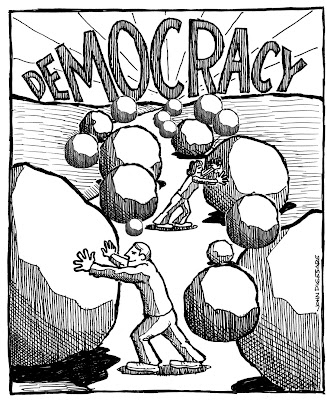Nephew: That is why I love you?
Sis: Why?
N: Because you stick things for me (she was fixing the broken trunk of his elephant)
S: And if I didn't?
N: Even then.
(I have to be technically correct and saying "small" to a little boy is technically invalid)
Me: When you were smaller I used to sing this song for you and put you to sleep.
(He listens for a while)
N: But I am not feeling sleepy
Me: If you were to lie down and close your eyes and let me pat you, then you would fall asleep.
N: I would sleep anyway then. Is that Krishna's flute? (noting the flute played in the background score of the song)
N: Paati, I am going to see black Ganapati (that's his favourite temple near our house). I will be sitting there. You come whenever you want to.
(All of us simply shake our head while he walks out. In a while he returns)
N: I will leave my crocs here.
Sis: Why?
N: What if I leave it there and when I am talking to black Ganapati, someone steals it? (seriously? your size?)
And I could go on listing the funny things he says throughout the day. We play this game where there is an imaginary TV and he has the remote. He says "click" (more like "chuck") and I am supposed to act like as if I am watching the TV (enacted by my giving running commentary about the Tom & Jerry cartoon that is supposedly playing) and he says "click" again and I am supposed to cry and whine that I do not get time to watch TV etc. The irony is that this game started when I was mocking the way he would cry every time my mother changed channels to her serials (I am glad he hasn't taken a fascination for them) and he found it more funny than mocking! Since then, the game stuck.
A few weeks ago and on several earlier instances, I had had a chance to discuss the approach we take with children and their behaviour and how it compares with our response to adult behaviour. A common comment one hears is "Children are so innocent and pure and selfless". It might seem funny that I would object to all of that (to varying degrees) especially after taking no pains to hide the extent to which I love children.
Children are innocent in as far as their intentions go but they are not innocent in achieving their ends. Observe a child and how s/he knows exactly whom to ask for that extra piece of chocolate or how to ask (big eyes, cute cuddles, maybe a tear or two). When one carefully observes children (and I have enjoyed doing that) one finds it difficult to deny that children are the prototypes of what adults become. Let me present my arguments (if you are still around reading this blasphemous piece by someone who calls himself a child lover). Towards the end, you might also find reasons as to why we still stick to them and allow ourselves to be blinded.
Children (let us restrict ourselves to ages 0-10) are considered to be innocent, selfless, loving and creative. They are also considered to be noisy, pesky, cantankerous and always the first one to pick (and drop) your most precious China. Children are never selfless. Frankly, they are the most selfish forms of human beings. They do not care for the situation and/or circumstance: they want their meal now, they want their sleep now, they want you to pick them up now! That is not being selfish? What is? I thought selfish meant the following:
devoted to or caring only for oneself; concerned primarily with one's own interests, benefits, welfare, etc., regardless of others.Doesn't that sound just like that 1 year old you met? No doubt, they are without defense and hence, need to be looked after and protected and nurtured. But does it make them more considerate? Understanding? And I would request all moms reading this to not start out with "My little boy is surely not selfish! How rude!" If there is any mother out there who has never lost her cool or corrected her child's behaviour even once during the first 7 years of her child, then I would wonder how she defines "selfish".
Children cannot be reasoned with beyond a point. Rationality doesn't work with them - stories do, exaggerated expressions do, lies do. All that we present even to adults only to have other adults call us schemers or liars. We say "come on, a child cannot be expected to understand". Well, my manager also said "come on, you cannot expect all men to be objective and understand everything without an ego". That is one thing children do not have very much, because they are vulnerable and have pure needs. Since they need food (and cannot procure it themselves let alone prepare it) they will dissolve their feuds with you. Since they are not comfortable with themselves and cannot even imagine being in a room all by themselves for more than 10 sec (without Cartoon Network), they will drop all grievances. Adults do that too when they stand in a long queue in a government office. They too request the officer "to forgive them and let bygones be bygones" but we hold on to our cribs; kids usually do not since their memory is not entirely that sharp. I have observed that children who are fed and surrounded by people will not hesitate to throw a tantrum or act insolent. They can get away with it till the next meal and as long as someone else is willing to pamper them. Hence, the common theory that children in houses where the grandparents reside tend to be a little more bratty (but the best thing about children is that they throw all generalisations into the dustbin).
Children are creative perhaps after a certain age. They are open to being wrong and hence, are without the inhibitions that prevent creativity from surfacing. That doesn't make all of them creative. I have known and seen kids simply doing nothing more than what was required to get them what they wanted. Kids sitting at home because it was extremely hot outside don't create new games - they watch Cartoon Network or Nick or (nowadays) get on the Internet. Even when we open our gates wider and be more tolerant, we can only observe creativity in children in matters where they associate two thing which we would never have. This come more out of ignorance and the comfort in being wrong (as mentioned earlier). A child will tap his spoons on upturned buckets because kids like noise and not because he is a rudimentary Mozart. Kids love noise and mess and bear hugs. They love attention, too. If a kid goes about smearing the wall with a lot of crayons that's because they love the mess that comes with it. They don't care about colour synchrony or shapes and sizes or even meaning. They love the opportunity to smear red over a clean wall and then blue and then throw some water on all of it and then shoe polish (and maybe even taste it a bit). Give a child a sheet of paper and lots of crayons, and the child is mostly likely going to "draw" a lot of circles, then dashes and then dizzying circles till the paper tears or the crayons break or both.
Perhaps when they are 5 and above they do manage to be creative. What is wrong in calling children creative? Nothing. So are adults. No, no, no, adults might be creative but they are also very destructive, hence their creativity is balanced by the destructive nature (because of insecurity, want for power, etc.) unlike kids who are purely creative and hence, score more points. Well, not really. You probably should meet kids!
Kids are instinctively destructive. A lot of their destructive nature is borne on clumsiness and also on their inclination to not care (which to me is the single greatest cause for destruction: Nazis didn't care about the Jews, the Americans didn't care about the civilians in Japan, no soldier cares about the enemy, no religious fanatic cares about the spiritual and/or philosophical inclinations of another). They don't care how much you value your crystal. They do not know or care that water in the Bose speaker system is not funny (though the sounds thereafter might seem so). You can tell them a hundred times not to bounce the ball off the glass of the shelves but they still might. They might sit on your spectacles because they were lost in ninja Hatori's jump across buildings.
I would urge readers to read the book Lord of the Flies (I finally discovered my lost copy of the book: now I have two copies). Golding weaves a remarkable tale about a band of boys stranded on an island and the dynamics between them. There is this scene where Jack tries to establish his supremacy because he can hunt and kill pigs. Their chant repulsed me the first time I read it. Perhaps they fall outside the age range of years stated at the outset.
I have observed children grab another kid's toy or break toys or bang anything they can hold in their hands, to the ground. Children like noise though grabbing another kid's toys is more than just noise. I do not wish to psychoanalyse kids but their acquisitive nature is obvious in nearly all of their interactions and actions. My friend's daughter demands to be the first one to be fed and will not accept anyone receiving their order (at a restaurant) without giving her one spoon of the dish. This might sound like an exception, but most children demonstrate similar traits in different contexts. It might be with toys, attention, food or the TV!
No one teaches them to break and children do not learn after having cracked their first bowl. They will still go ahead and break something else. Perhaps not intentionally but sometimes just because the thing can break. Children love to take things apart. My colleague has had his laptop keyboard replaced several times. Keys simply go missing! So, in their own way, children are destructive. They do not know of a city beyond their house and if they do, they do not think in terms of conquering that city (because their parents give them whatever they want). My nephew once invited another kid to play with him and hugged him. That boy freaked out and ran away. My nephew, being the element he is, began chasing him. The other kid lost his balance and fell so my nephew went over to help him. That kid not knowing what to do to get rid of this boy, bit him really hard on his stomach. My nephew came back crying with red teeth marks around his navel (calamine lotion helps). Both of them were probably 3 years old.
Children are vulnerable and hence, they cling on to adults (usually parents). They cannot dream of a day without them. The sudden absence of the mother or father creates in them a panic attack and they cry inconsolably. If children had their parents around, they do not bother about others. It doesn't matter whether someone is around or not. Love, doesn't exist in such an environment. It sounds harsh to say that children perhaps don't love, but love is a very different state which is not a need based or fear based response. My nephew doesn't love me. He enjoys his time with me and loves it when I animate his book reading sessions. He loves it when I crush him and cover him with kisses. He loves it when I play Kwala and Boowa with him. I don't think he loves anyone other than his mother and in some instances, his father. He does love black Ganpati, though! I don't blame him nor do I feel disappointed. I simply cannot expect a child to be capable of love. A child is capable of being simple and loves to be cuddled (or any other physical contact which, sadly, adults grow to dishonour). But love is too strong a state for them. In order to love, they would need to be conscious and that they are not capable of. The really sharp ones manage to be aware but their awareness is most often focused on signals and indicators for their purpose.
Which brings us to the last post to topple - innocence. That they are. They will trust you and say things as they happened only till they realise that such a family of "things" seem to get dad angry. So they start hiding their occurrences or lie about them. Innocence definitely was there at the outset, but then there are a lot of adults who are innocent till they learn action-reward-punishment patterns. A young researcher might feel that it is ok to discuss his findings with anyone till he learns that plagiarism is rife in the academic circles. A fledgling lawyer (and you could read Sidney Sheldon's Rage of Angels) might believe that everyone will argue only based on facts till he meets his first opponent who "creates" facts. Why! I too believed what people said until I realised that people have every right to go back on their word. Few friends thought I was innocent, but most people thought I was plain stupid.
Since a child has more "new events" and lesser "experience" s/he appears innocent. It would be like subjecting an uneducated man to a crossword puzzle and then calling his attempts as "innocent". Once a child learns that mommy doesn't like spilt milk, he will wipe all the spilt milk and claim that he drank it all. A child who knows that daddy will not like it if he found out who tore his office papers will rush into bed and act like he is sleeping, or stand in a corner scared till mommy comes and scolds daddy for being so harsh on the kid "all for a piece of useless office paper". The kid then knows that going to mommy will save him. Adults do that too. Tarzan, brought up as an animal, would appear innocent to most people in the city (because he doesn't care what he wears and willingly hands over the gold watch to someone who promised him to get it polished) but if he knows an action will get him his Jane, he will do it. Innocence vanishes where there is knowledge and the ability to extrapolate. Children are gaining knowledge and hence, appear innocent. A new programmer or a janitor faced with the task of getting this new cleaning contraption to work, might also appear innocent.
Innocence is the trait of all individuals who do not possess knowledge. Children start out without any knowledge just like villagers who enter the big city. How many movies were made on that theme! Raj Kapoor in India lived off the character of the village bumpkin in nearly all his movies. So yes, children are by default innocent but that trait is not unique to them and they don't cling to it if it causes them any trouble. When people say that "innocence dies as children grow up" it would be equally valid to say "a freshman's innocence vanishes as he becomes a senior".
So what keeps us going on and wanting kids? Hope. That is all that we have and so powerful is its promise that we are willing to go through all the hell (and beauty) that a child can create simply to realise the hope that we would nurture and rear a decent human being, someone who will make us proud, someone who will be our support when we need one, someone who will someday love us the way we did, not looking at any of our (mis)deeds as selfish, destructive, hopeless or pointless. It is merely hope and occasionally the opportunity to love someone without their realising how vulnerable we let ourselves be (for true love will strip you mercilessly) that let's us view these prospective adults as children, a different sub-specie of human beings with the wonderful qualities of selflessness, creativity, love and innocence. Or maybe, as the lady says in the movie Ghost in the Shell, it is our obsessions with creating androids/dolls that leads us to procreation!











